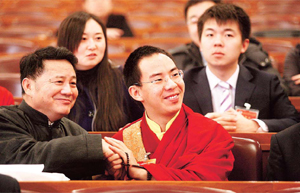Full text: Report on national economic, social development
(Xinhua)
Updated: 2010-03-16 14:14
III. Major Tasks and Measures for Economic and Social Development in 2010
An analysis of domestic and international development environments and conditions shows that we face arduous tasks in promoting reform and development and maintaining stability this year. To achieve the major objectives for economic and social development, we need to integrate efforts to maintain steady and rapid economic development with those to adjust the economic structure, and genuinely make development more sustainable. We need to integrate efforts to boost domestic demand, especially consumer demand, with those to maintain the level of external demand, and strive to make economic development more balanced. We need to integrate efforts to balance development between urban and rural areas and among regions with those to promote urbanization, and do all we can to create more room for development. We need to integrate efforts to promote independent innovation with those to foster emerging industries of strategic importance, and strive to achieve innovation-driven development. We need to integrate efforts to deepen reform with those to promote development, and comprehensively increase the inherent driving force of economic development. Moreover, we need to integrate efforts to develop the economy with those to improve people's well-being, and further balance economic and social development.
1. We will further improve macro-control and strive to maintain steady and rapid economic development. We need to maintain continuity and consistency in macroeconomic policies and implement them with the appropriate intensity, pace and focus.
1) We will continue to follow a proactive fiscal policy. We will keep the deficit and government bonds at appropriate levels. We propose setting the country's deficit at 1.05 trillion yuan this year, accounting for less than 3% of GDP, roughly the same as last year. Of this sum, 850 billion yuan will be incurred by the central government deficit, and 200 billion yuan will be incurred through local government bonds to be issued by the Ministry of Finance and listed in local government budgets. We will continue to implement the policy on structural tax reduction. We will further optimize the structure of government expenditures, and give more support to key areas and weak links in accordance with the principle of stressing key areas and guaranteeing some expenditures while reducing others. We will be thrifty in everything we do, continue to strictly control regular expenditures, and strive to lower administrative costs.
2) We will continue to implement a moderately easy monetary policy. We will appropriately increase the supply of money and credit and use a combination of various monetary policy tools to improve liquidity management in order to ensure rational and sufficient liquidity in the banking sector. The broad money supply (M2) will be increased by about 17%, and the scale of RMB loans will increase by approximately 7.5 trillion yuan this year. We will work hard to improve the credit structure. We will increase credit support for weak links in economic and social development, employment, emerging industries of strategic importance, and industrial relocation; effectively alleviate the financing difficulties facing agriculture and small businesses; ensure the credit demands of key development projects are satisfied; and strictly control lending to industries that are energy-intensive, highly polluting or have excess production capacity. We will continue to expand direct financing, improve the multilevel system for capital markets, expand the scale of corporate financing through bond issues, and optimize the financing structure.
3) We need to guard against fiscal and financial risks. We will improve supervision of local government debts, standardize the fund raising platform of local governments and rectify their practices of guaranteeing payment. We will strictly enforce the qualifications for granting loans, strengthen prudent management, and fend off systemic financial risks. We will effectively control the pace by which the credit supply changes and prevent abnormal monthly and quarterly fluctuations. We will further improve the renminbi exchange rate regime, and keep the renminbi exchange rate basically stable at an appropriate and balanced level.
We will continue to stimulate consumer demand. Total retail sales of consumer goods will grow by 15%.
1) We will adjust the pattern of national income distribution at a faster pace. A plan to adjust the pattern of national income distribution and relevant policies and measures will be formulated soon. We will continue to increase rural incomes through various channels, raise the basic old-age pensions for enterprise retirees and the benefits for some entitled groups, and implement the policy of applying a performance-based salary system in schools providing compulsory education, and in public health institutions and community-based medical and health care institutions. We will gradually raise minimum wage rates.
2) We will improve policies and measures to stimulate consumption. We will work harder to promote rural residents' purchase of home appliances and motor vehicles (including motorcycles); extend the implementation of the program for trading in old home appliances and the policy to subsidize rural residents' purchase of motor vehicles to the end of this year; and expand trials of home appliance trade-in program to more areas.
3) We will promote rational housing consumption. We will increase the land supply for developing public rental housing as well as small and medium-sized apartment housing to be sold at low and medium price levels; support the purchase of first or second homes, in the latter case, when the first home's per capita floor area is smaller than an established average; advocate renting over buying in housing consumption; continue to implement differentiated housing credit and tax policies; and rein in speculative housing purchases, all done in order to meet people's basic demand for housing. We will continue to rectify and standardize the real estate market; more severely punish those who hoard land without the intention to build housing, withhold completed housing from the market, and collude to drive up housing prices; and curb the overheating of housing prices presently affecting some cities.
4) We will promote the consumption of services. We will vigorously develop the cultural & creative industry, film and television production, publishing, theatrical performances and entertainment, conventions and exhibitions, animation and other cultural industries. We will also accelerate development of broadband networks; support businesses concerning the integration of telecommunications networks, cable TV networks and the Internet; and stimulate consumption of services in culture, tourism, sports, fitness, education, training, and elderly care.
5) We will improve the consumption climate. We will expand consumer credit; strengthen development of infrastructure such as networks for distributing goods; and intensely press ahead with the project to get retailers to open stores in more townships and villages. We will vigorously rectify and standardize market prices, and further tighten oversight and management over the quality and safety of products, especially food and drugs.
We will maintain a rational scale of investment and improve the investment structure. Total investment in fixed assets across the country will increase by 20%, with a 21% growth in investment in construction and renovation and an 18% rise in investment in real estate development.
1) We will effectively develop government-financed projects. Implementation of the plan to invest an additional 4 trillion yuan will continue. In line with the requirement that the central government shall increase investment by a total of 1.18 trillion yuan over the two-year period of 2009-2010, added to the 572.2 billion yuan of investment we have planned to increase in 2010, central government investment this year will equal 992.7 billion yuan, including 392.6 billion yuan of investment in capital construction. While making investment plans, we will continue to give higher priority to agriculture, rural areas, farmers, low-income housing, health, education and other aspects related to people's well-being; and to the central and western regions, old revolutionary areas, ethnic minority areas, border areas, and poor areas. These plans will also continue to support energy conservation, environmental protection, independent innovation and technological upgrading. We will use these funds mainly on projects that are under construction or near completion, strictly control the number of new projects, and ensure projects are not stopped midway.
2) We will actively encourage investment from non-government sources. We will promptly introduce and implement policies and measures to encourage and guide sound development of non-government investment, open up more areas to non-government capital sources, further eliminate barriers to non-government investment, and support non-government investment in weak links of economic and social development such as public utilities and social programs.
3) We will strengthen and improve investment management. We will establish a sound mechanism for departments to coordinate their actions and controls and share information, and study how to better manage investment projects in the areas of land use, environmental impact assessment, energy conservation, credit availability and industrial policy. We will control the proportion of bank loans used to launch new projects. We will strictly control the launching of new projects in industries that are energy-intensive, highly polluting or have excess production capacity, as well as unnecessary and inappropriate vanity projects. We will move faster to develop a legislative framework for investment management. We will tighten oversight, inspection and auditing of government-financed projects and seriously investigate and prosecute violators of regulations to ensure the safety of funds and project quality.
We need to ensure adequate market supplies and steady prices for grain, edible oil and other important commodities. We will improve regulation of the markets for major agricultural products, flexibly control the intensity and pace of adjusting their reserves and import and export volumes, and do a good job of purchasing, marketing, allocating and transporting important commodities such as grain and edible oil in order to ensure their abundant supplies in the market. We will improve monitoring, early warning and situation analysis of prices, prepare sound contingency plans, standardize pricing, correctly guide public opinion, stabilize market expectations, and keep overall price levels basically stable.
We need to regulate economic activities well. We will improve dynamic monitoring and comprehensive analysis, and ensure that adequate supplies reach key areas at crucial times in light of a tight balance between supply and demand for coal, electricity, petroleum, gas and transport services and the occurrence of shortages in some areas. We will link coal production and transportation more closely with demand, make overall planning for balancing supply and demand for electricity, properly arrange electricity transmission across regional and provincial borders, improve demand-side management of electricity, balance supply and demand for refined petroleum products and natural gas and ensure their steady supplies, and guarantee transportation of key materials. We will replenish reserves of goods and materials for possible emergencies, improve contingency mechanisms, and strengthen our ability to respond to emergencies.


